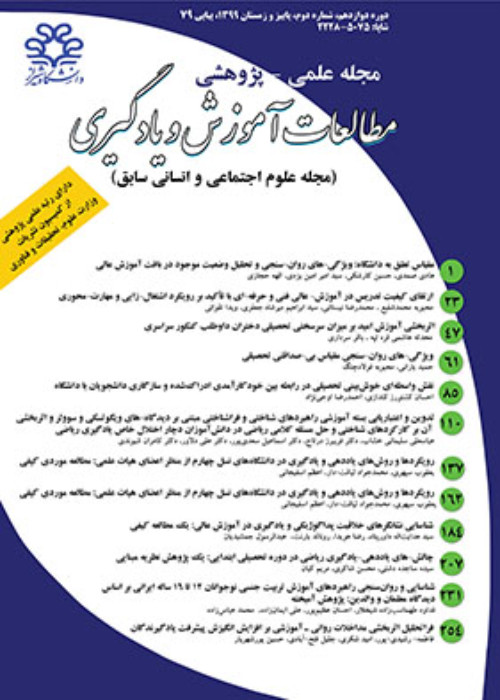Emotional Intelligence and Coping Styles with Stress
Author(s):
Abstract:
IntroductionCoping strategies (styles) play a major role in an individual´s physical and mental health when confronting with stressful situations. “The construct of coping has been defined as the cognitive and behavioral efforts of an individual to manage the external and/or internal demands encountered during specific stressful situation” (Lazarus & Folkman, 1984). Coping responses have been categorized into three broad higher order functions including problem-focused (task-oriented) coping, emotion-focused coping, and avoidance-focused coping (Billings & Moos, 1981; Zeidner & Endler, 1996). Problem-focused coping refers to actions that are employed in order to reduce demands or increase skills to manage demands. Emotion-focused coping represents the actions that are employed in order to change the meaning of a stressful situation as well as to regulate the resulting negative emotions. Finally, avoidance-focused coping refers to actions that are employed in order to disengage oneself from a stressful situation. One factor that impacts on people´s ability to cope with stress is their level of emotional intelligence “(Salovey, Mayer & Caruso, 2002). According to Mayer and Salovey (1997), emotional intelligence is a multi-dimensional construct which can be divided into (a) the perception of emotion, (b) the emotional facilitation of thinking, (c) the emotional understanding, and (d) the emotional management (p. 1091). Research evidence suggests that higher emotional intelligence is related to positive interpersonal qualities (e.g., Petrides & Furnham, 2000; Sakofske, Austin, & Minski, 2003; Salovey et al., 2002; Schutte, Malouff, Hall, Haggerty, Cooper et al., 1998). Empirical studies have also found that low emotional inteeligence is associated with more maladaptive coping strategies and high emotional inteeigence is associated with more adaptive coping strategies (Furnham, Petrides, & Spencer-Bowdage, 2002; Salovey, Strod, Woolery, & Epel, 2002). The aim this study was to examine the relationship between emotional inteeligence and coping styles with stress in a sample of students. On the basis of existing evidence, our hypotheses were twofold: First, it was expected that emotional intelligence would correlate positively with problem-focused and positive emotional focused coping styles. Second, it was predicted that emotional intelligence would correlate negatively with negative emotional focused coping style. Mehod Participants and Procedure A total of 413 undergraduate students (140 boys and 273 girls) from the University of Tehran tood part as volunteers in the present study (mean age= 20. 77 years, age range= 19 to 28, SD- 2. 70). Participants were asked to take part in a "study on personality and behavior" via announcements made by relevant lectures in classrooms. Questionnaires were completed in caasses consisting of 20-30 students in the presence of the researchers who gave a brief description of the materials and answered questions. All participants were asked to complete the Emotional Intelligence Scale (EIS; Austin, Saklofske, Huang, & McKenney, 2004; Schutte et al., 1998) and the Tehran Coping Styles Scale (TCSS; Carver, Scheier, & Weintrub, 1989; Besharat, 1387/2008). MeasuresEmotional Intelligence Scale-41- The EIS-41 is a revised version of the 33-item emotional intelligence scale of Schutte et al. (1998), devised by Austin et al. (2004). Adequate psychometric properties of the scale and a three-factor structure including Optimism/Mood Regulation, Utilization of Emotions and Appraisal of Emotions have been reported 9Austin et al., 2004; Besharat, 2007; Schutte et al., 1998). Tehran Coping Styles Scale (TCSS)- The TCSS is a 60- item scale devised by Carver et al. 91989) and validated by Besharat (1387/2008) for Iranian populations. Adequate psychometric properties of the scale and a three-facor structure including problem-focused coping, positive emotional-focused coping and negative emotional-focused coping styles have been reported (Besharat, 1387/2008; Carver et al., 1989). ResultsA correlational analysis was performed to assess the kind of association existing among components of emotional intelligence with coping styles including problem-focused, positive emotional focused, and negative emotional focused. Analysis of the data involved both descriptive and inferential statistics including means, standard deviations, analysis of variance, Pearson´s correlation coefficient, and regression analyses. The results revealed that emotional intelligence was positively associated with problem-focused and positive emotional focused coping styles, and negatively associated with negative emotional focused coping style.DiscussionThe present study found that emotional intelligence, as measured by EIS-41 in a student sample, was positively associated with the use of problem-focused and positive emotional focused coping styles and negatively with the use of negative emotional focused coping style. These findings are consistent with those of previous studies in which higher emotional intelligence was found to be associated with more adaptive coping styles and low emotional intelligence was found to be associated with more maladaptive coping styles (Furnham et al., 2002; Petrides & Furnham, 2000; Saklofske et al., 2003; Salovey et al., 2002). Emotional intelligence is supposed to influence coping strategies through management and regulation of emotions, utilization and facilitation of emotions, and appraisal of emotions.
Language:
Persian
Published:
Studies in Learning & Instruction, Volume:2 Issue: 1, 2011
Page:
33
magiran.com/p966251
دانلود و مطالعه متن این مقاله با یکی از روشهای زیر امکان پذیر است:
اشتراک شخصی
با عضویت و پرداخت آنلاین حق اشتراک یکساله به مبلغ 1,390,000ريال میتوانید 70 عنوان مطلب دانلود کنید!
اشتراک سازمانی
به کتابخانه دانشگاه یا محل کار خود پیشنهاد کنید تا اشتراک سازمانی این پایگاه را برای دسترسی نامحدود همه کاربران به متن مطالب تهیه نمایند!
توجه!
- حق عضویت دریافتی صرف حمایت از نشریات عضو و نگهداری، تکمیل و توسعه مگیران میشود.
- پرداخت حق اشتراک و دانلود مقالات اجازه بازنشر آن در سایر رسانههای چاپی و دیجیتال را به کاربر نمیدهد.
In order to view content subscription is required
Personal subscription
Subscribe magiran.com for 70 € euros via PayPal and download 70 articles during a year.
Organization subscription
Please contact us to subscribe your university or library for unlimited access!




